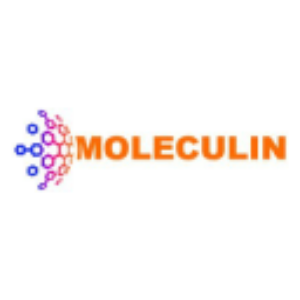Moleculin Awarded New Rare Pediatric Disease Designation from U.S. FDA for WP1066 for the Treatment of Ependymoma
Moleculin Biotech, Inc. (Nasdaq: MBRX) announced that the FDA has granted Rare Pediatric Disease Designation to its drug WP1066 for treating ependymoma, a rare tumor affecting the brain and spinal cord, mainly in children. This designation recognizes the unmet medical needs in this area and allows for potential incentives, including a priority review voucher upon approval. Moleculin already holds Orphan Drug Designation for WP1066 and aims to advance its development program, believing WP1066 has the potential for effective therapy in pediatric patients.
- FDA granted Rare Pediatric Disease Designation to WP1066, enhancing its development prospects.
- Moleculin has Orphan Drug Designation for WP1066, indicating recognized therapeutic potential.
- None.
HOUSTON, April 14, 2021 /PRNewswire/ -- Moleculin Biotech, Inc., (Nasdaq: MBRX) ("Moleculin" or the "Company"), a clinical stage pharmaceutical company with a broad portfolio of drug candidates targeting highly resistant tumors and viruses, announced today that the U.S. Food and Drug Administration (FDA) has granted Rare Pediatric Disease Designation (RPD) to its p-STAT3 inhibitor, WP1066, for the treatment of ependymoma.
Ependymoma is a rare type of tumor that can form in the brain or spinal cord. Ependymoma begins in the ependymal cells in the brain and spinal cord that line the passageways where the fluid (cerebrospinal fluid) that nourishes your brain flows. Ependymoma can occur at any age, but most often occurs in young children.
"The FDA's recognition of the high prevalence and unmet needs in the treatment landscape for ependymoma, especially in pediatric patients is a significant milestone as we continue to advance and expand the WP1066 development program. We currently have Orphan Drug Designation for WP1066 for the treatment of brain tumors, as well as RPD designation for three other pediatric indications, and believe that ependymoma represents another important rare indication. We continue to be encouraged by the data WP1066 has demonstrated to date and believe it has the potential to be an effective therapy for pediatric patients with ependymoma," commented Walter Klemp, Chairman and CEO of Moleculin.
The Rare Pediatric Disease Priority Review Voucher program, which was created as part of the Food and Drug Administration Safety and Innovation Act (FDASIA) of 2012, is intended to incentivize the development of new therapies for rare pediatric diseases. Under the FDA's rare pediatric disease designation program, the FDA may grant a priority review voucher to a sponsor who receives a product approval for a "rare pediatric disease," which is defined as a serious or life-threatening disease in which the serious or life-threatening manifestations primarily affect individuals aged from birth to 18 years and affects fewer than 200,000 people in the U.S. Subject to FDA approval of WP1066 for the treatment of ependymoma, Moleculin would be eligible to receive a voucher that may be redeemed to receive priority review for a subsequent marketing application for a different product candidate or which could be sold or transferred.
About WP1066
WP1066 is an immune/transcription modulator capable of directly inhibiting certain key oncogenic transcription factors, including the activated form of a protein known as STAT3. The activated form of STAT3 referred to as p-STAT3, is considered a master regulator of tumor activity. In addition to inhibiting p-STAT3 and several other signaling proteins linked to tumor development, WP1066 has also been shown in animal models to stimulate a natural immune response and immune memory to fight tumor progression.
About Moleculin Biotech, Inc.
Moleculin Biotech, Inc. is a clinical stage pharmaceutical company focused on the development of a broad portfolio of oncology drug candidates for the treatment of highly resistant tumors and viruses. The Company's clinical stage drugs are: Annamycin, a next-generation anthracycline, designed to avoid multidrug resistance mechanisms with little to no cardiotoxicity being studied for the treatment of relapsed or refractory acute myeloid leukemia, more commonly referred to as AML, WP1066, an Immune/Transcription Modulator capable of inhibiting p-STAT3 and other oncogenic transcription factors while also stimulating a natural immune response, targeting brain tumors, pancreatic cancer and hematologic malignancies, and WP1220, an analog to WP1066, for the topical treatment of cutaneous T-cell lymphoma. Moleculin is also engaged in preclinical development of additional drug candidates, including other Immune/Transcription Modulators, as well as WP1122 and related compounds capable of Metabolism/Glycosylation Inhibition.
For more information about the Company, please visit http://www.moleculin.com.
Forward-Looking Statements
Some of the statements in this release are forward-looking statements within the meaning of Section 27A of the Securities Act of 1933, Section 21E of the Securities Exchange Act of 1934 and the Private Securities Litigation Reform Act of 1995, which involve risks and uncertainties. Forward-looking statements in this press release include, without limitation, the ability of WP1066 to show safety and efficacy in ependymoma patients. Although Moleculin believes that the expectations reflected in such forward-looking statements are reasonable as of the date made, expectations may prove to have been materially different from the results expressed or implied by such forward-looking statements. Moleculin has attempted to identify forward-looking statements by terminology including ''believes,'' ''estimates,'' ''anticipates,'' ''expects,'' ''plans,'' ''projects,'' ''intends,'' ''potential,'' ''may,'' ''could,'' ''might,'' ''will,'' ''should,'' ''approximately'' or other words that convey uncertainty of future events or outcomes to identify these forward-looking statements. These statements are only predictions and involve known and unknown risks, uncertainties, and other factors, including those discussed under Item 1A. "Risk Factors" in our most recently filed Form 10-K filed with the Securities and Exchange Commission ("SEC") and updated from time to time in our Form 10-Q filings and in our other public filings with the SEC. Any forward-looking statements contained in this release speak only as of its date. We undertake no obligation to update any forward-looking statements contained in this release to reflect events or circumstances occurring after its date or to reflect the occurrence of unanticipated events.
Investor Contact:
JTC Team, LLC
Jenene Thomas
(833) 475-8247
MBRX@jtcir.com
![]() View original content to download multimedia:http://www.prnewswire.com/news-releases/moleculin-awarded-new-rare-pediatric-disease-designation-from-us-fda-for-wp1066-for-the-treatment-of-ependymoma-301268294.html
View original content to download multimedia:http://www.prnewswire.com/news-releases/moleculin-awarded-new-rare-pediatric-disease-designation-from-us-fda-for-wp1066-for-the-treatment-of-ependymoma-301268294.html
SOURCE Moleculin Biotech, Inc.
FAQ
What designation did Moleculin Biotech receive for WP1066?
What is WP1066 used to treat?
What are the potential benefits of the Rare Pediatric Disease Designation?








